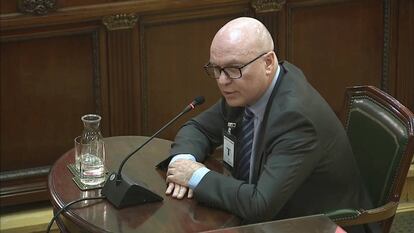Catalan premier ignored police calls to cancel 2017 independence referendum
At Supreme Court trial, ex-chief of security planning for the Mossos d’Esquadra said they were “aware” of the difficulties of stopping the vote with just two officers per polling station

Former Catalan premier Carles Puigdemont twice disregarded requests by the regional police force to call off the unauthorized referendum of October 1, 2017 despite the “climate of tension” in Catalonia, according to a witness at the trial of Catalan separatist leaders taking place in Madrid.
Emili Quevedo, who was the security planning chief for the Mossos d’Esquadra force at the time, told judges at the Supreme Court on Monday that Puigdemont held a meeting with top Mossos officers at which he insisted on pressing ahead with the referendum because of “a mandate backed by the results” of the previous regional election. At the 2015 polls, separatist parties had obtained a collective majority of 72 seats with slightly under 48% of the vote.
“Faced with the political initiatives [taking place] in Catalonia, there was no doubt that tension could be generated in the region, or conflict between antagonistic groups. There was a particular need to protect specific institutions and individuals,” said the former security planning chief.
There was a particular need to protect specific institutions and individuals
Emili Quevedo, Mossos planning chief
Quevedo is the latest in a long list of witnesses to take the stand in Madrid, where 12 politicians and civil society leaders are being tried for rebellion, sedition, disobedience and misuse of public funds in connection with the referendum and the unilateral independence declaration of late October 2017.
The pro-independence movement sees the trial as politically motivated and defines the defendants as “political prisoners.” Some of these individuals, including Oriol Junqueras, Puigdemont’s former deputy, will run in the upcoming national election in Spain despite being currently in prison awaiting the end of the trial and a ruling by the panel of seven justices trying the case. Puigdemont himself, who lives in self-imposed exile in Belgium, will run as a candidate in the European parliament election of May 26.
On Monday, Quevedo defended the actions of the Mossos on referendum day, denying accusations from the National Police and Civil Guard to the effect that the regional police were deliberately passive and left it up to the other two law-enforcement agencies to enforce a court order to stop the vote from taking place. He said that an additional 800 officers who do not normally do street patrolling were sent out on October 1, and that further “extraordinary resources” were tapped, such as renting extra vehicles.
Quevedo defended the actions of the Mossos on referendum day
Asked why there were only two Mossos officers at each polling station, Quevedo said that he and other agency chiefs were aware that “in some cases, the officers would not be able to carry out their mission.” There were 2,385 polling stations open that day. Quevedo said that he and the others had warned that effectively stopping the vote would require “a colossal” police operation involving between 20,000 and 40,000 officers.
Images of police officers restraining would-be voters made world headlines and contributed to what the pro-independence movement has called “the internationalization of the procès,” as the independence bid is popularly referred to. The highly anticipated trial at the Supreme Court is being covered by 50 foreign media outlets, and Prime Minister Pedro Sánchez of the Socialist Party (PSOE) traveled to Strasbourg shortly before the hearings began, to meet with EU leaders and defend the impartiality of the Spanish justice system.
English version by Susana Urra.
Tu suscripción se está usando en otro dispositivo
¿Quieres añadir otro usuario a tu suscripción?
Si continúas leyendo en este dispositivo, no se podrá leer en el otro.
FlechaTu suscripción se está usando en otro dispositivo y solo puedes acceder a EL PAÍS desde un dispositivo a la vez.
Si quieres compartir tu cuenta, cambia tu suscripción a la modalidad Premium, así podrás añadir otro usuario. Cada uno accederá con su propia cuenta de email, lo que os permitirá personalizar vuestra experiencia en EL PAÍS.
¿Tienes una suscripción de empresa? Accede aquí para contratar más cuentas.
En el caso de no saber quién está usando tu cuenta, te recomendamos cambiar tu contraseña aquí.
Si decides continuar compartiendo tu cuenta, este mensaje se mostrará en tu dispositivo y en el de la otra persona que está usando tu cuenta de forma indefinida, afectando a tu experiencia de lectura. Puedes consultar aquí los términos y condiciones de la suscripción digital.








































